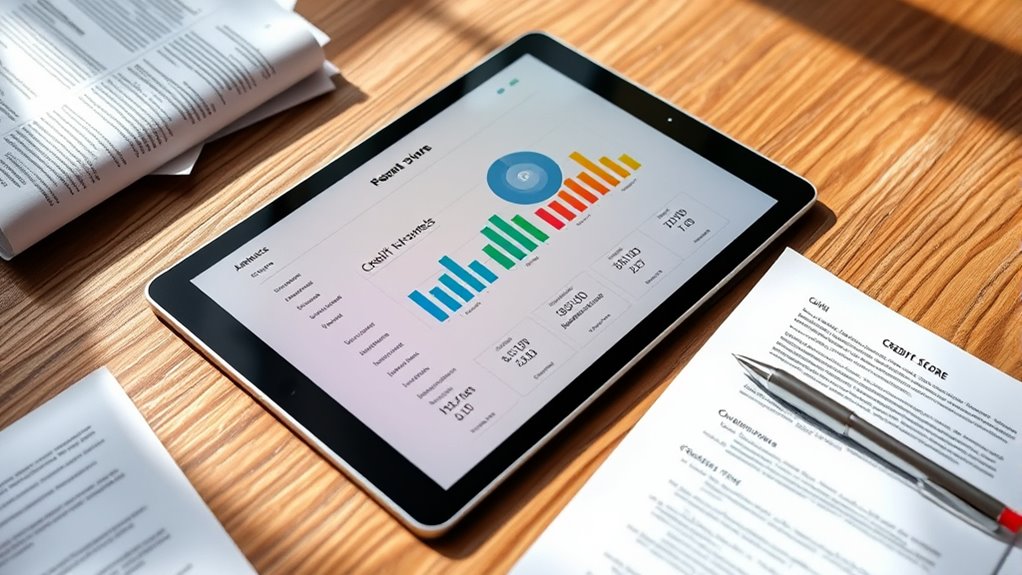During divorce, using a credit score monitoring tracker helps you stay aware of your credit health, spot errors or suspicious activity early, and make confident financial decisions. It offers real-time updates, giving you control and peace of mind during this stressful time. Monitoring your credit can also support your financial planning, ensuring a stable future. Keep exploring the tools and tips that can keep your credit on track through this progression.
Key Takeaways
- Enables real-time credit updates to detect changes or errors during divorce proceedings.
- Provides emotional reassurance and control amid financial uncertainty.
- Supports setting and tracking financial goals post-divorce for a stable future.
- Helps identify fraudulent activity early, protecting against identity theft risks.
- Maintains ongoing credit health awareness to facilitate responsible financial decisions.

Divorcing can be an overwhelming process, especially when it comes to managing your financial health. During this time, staying on top of your credit score becomes vital, as it directly impacts your financial future. A credit score monitoring tracker can be your best ally in this journey, providing real-time updates and helping you make informed decisions. As you navigate the complexities of divorce, you’ll need to prioritize financial planning—understanding where you stand financially and setting clear goals for the future. By consistently tracking your credit, you can identify any sudden changes or inaccuracies that might affect your creditworthiness, giving you the opportunity to address issues promptly. This proactive approach helps minimize surprises down the road, whether you’re applying for new credit, refinancing, or establishing a fresh start financially.
Managing your credit during divorce isn’t just about numbers; it’s also about emotional support. Divorce can stir up a range of feelings—stress, anxiety, uncertainty—which can make it tempting to ignore your financial health. But staying engaged with your credit status can provide a sense of control and stability amidst emotional upheaval. Using a credit score monitoring tracker allows you to stay connected to your financial landscape, helping you feel empowered rather than overwhelmed. It also keeps you alert to any suspicious activity or identity theft, which can sometimes occur during times of personal upheaval. The reassurance that your credit is being actively monitored can reduce some of the emotional strain, allowing you to focus on other aspects of your life with greater confidence.
Additionally, a credit score tracker helps you see the tangible progress you’re making toward rebuilding or maintaining your financial stability. As you work through divorce-related financial adjustments, having a clear view of your credit status can motivate you to stay disciplined with your financial planning. It encourages responsible credit usage, timely payments, and informed decisions about loans or credit cards—all of which are essential for establishing a secure financial foundation post-divorce. Remember, your credit health is an ongoing concern, and regular monitoring can prevent future complications. It’s an essential tool that supports both your financial goals and emotional well-being, providing the reassurance needed during this challenging transition. Ultimately, using a credit score monitoring tracker helps you stay proactive, confident, and prepared for the next chapter of your life.
Frequently Asked Questions
How Early Should I Start Monitoring My Credit During Divorce?
You should start monitoring your credit as soon as you decide to divorce. Early tracking helps you stay on top of any changes and protects your financial planning. It also allows you to identify potential issues that could affect credit rebuilding efforts later. By staying proactive, you can address problems promptly, ensuring a smoother shift and better control over your credit health during this challenging time.
Can I Access My Ex-Spouse’s Credit Report Legally?
You can’t legally access your ex-spouse’s credit report without their permission due to privacy concerns and legal restrictions. The Fair Credit Reporting Act safeguards individuals’ privacy, preventing unauthorized access. If you’re concerned about shared debts or accounts, consider legal avenues like court orders or consulting a lawyer. Always respect privacy laws to avoid legal consequences and ensure you’re acting within your rights during the divorce process.
What Should I Do if I Find Fraudulent Activity?
If you find fraudulent activity, act quickly to protect your finances. Report the identity theft to the credit bureaus and place a fraud alert on your account. Review your credit report carefully, dispute any unauthorized charges, and consider freezing your credit to prevent further fraud. Staying vigilant helps with fraud prevention, and contacting authorities can help resolve the issue faster. Taking prompt action is essential to safeguard your credit and personal information.
How Does Divorce Affect My Credit Score?
Divorce can temporarily lower your credit score due to joint account closures or missed payments. To safeguard your financial independence, review your credit report and separate joint accounts. Focus on credit rebuilding by making on-time payments and reducing debt. Keeping a close eye on your credit score helps you stay aware of changes and ensures you’re on track to rebuild your credit after divorce.
Are There Specific Tools for Tracking Joint Account Impacts?
You wonder if there are specific tools for tracking joint account impacts? Yes, credit impact tools designed for joint account management can help you monitor how your shared accounts influence your credit score. These tools often alert you to changes, payment issues, or balances affecting both parties. Using them, you gain clarity and control during divorce, ensuring you’re aware of every financial move that could impact your future credit health.
Conclusion
As you navigate the complexities of divorce, monitoring your credit score becomes more than just a task—it’s a coincidence that can protect your financial future. Staying vigilant with a tracker helps you catch surprises early, ensuring your credit history remains intact during this shift. Remember, the smallest effort now can prevent bigger hurdles later. In the end, your awareness and proactive steps are the unexpected keys to a smoother financial new beginning.










